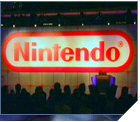|

 SATORU
IWATA:
Thank you Peter. A year ago, I told you about the
Nintendo Difference. The strategy we have always used to guide our
company. It has four cornerstones: innovation, game quality,
franchise characters, and our unique heritage. We have remained
consistent and the Nintendo difference has rewarded us well. In less
than twenty years, around the world, we have sold nearly 275 million
game systems and more than 1.6 billion games to play on those game
machines. Much of that software featured the Game Giants that Peter
Mentioned. Nintendo's purpose this year at E3 and beyond is to
spotlight them like never before. SATORU
IWATA:
Thank you Peter. A year ago, I told you about the
Nintendo Difference. The strategy we have always used to guide our
company. It has four cornerstones: innovation, game quality,
franchise characters, and our unique heritage. We have remained
consistent and the Nintendo difference has rewarded us well. In less
than twenty years, around the world, we have sold nearly 275 million
game systems and more than 1.6 billion games to play on those game
machines. Much of that software featured the Game Giants that Peter
Mentioned. Nintendo's purpose this year at E3 and beyond is to
spotlight them like never before.

Aside from our own established stars, I want to tell you tell you
today how we are moving aggressively to build our game development
resources in new ways. Earlier this month, we announced a broad new
agreement with Namco to bring eight new titles to Game Boy Advance
this year and six to Nintendo GameCube by the end of next year.
Included in those GameCube projects are not only Soul Calibur and
two different role playing games, but a wonderful shooting adventure
starring Star Fox.

Namco and Sega are both partners in development of the Triforce
board, a form of Nintendo GameCube technology that will power arcade
games. Many of those titles will launch almost simultaneously in
arcade and home versions.

All future Resident Evil games from Capcom will be exclusive for
Nintendo systems. We feel this is where these games belong. And you
are probably aware that Square and a subsidiary in Japan will be
generating new titles for both Game Boy Advance and Nintendo
GameCube. As all this indicates, our ties to independent third party
developers are now stronger than ever. And the strongest of all
developers are working with Nintendo.

Equally important is the growth of our talented and experienced
internal development groups who are working on many groundbreaking
projects. The combination of first, second, and third party titles
means more high quality Nintendo games than ever before and high
quality games for players of all ages. Peter, why don't you show
them what we mean...

|

